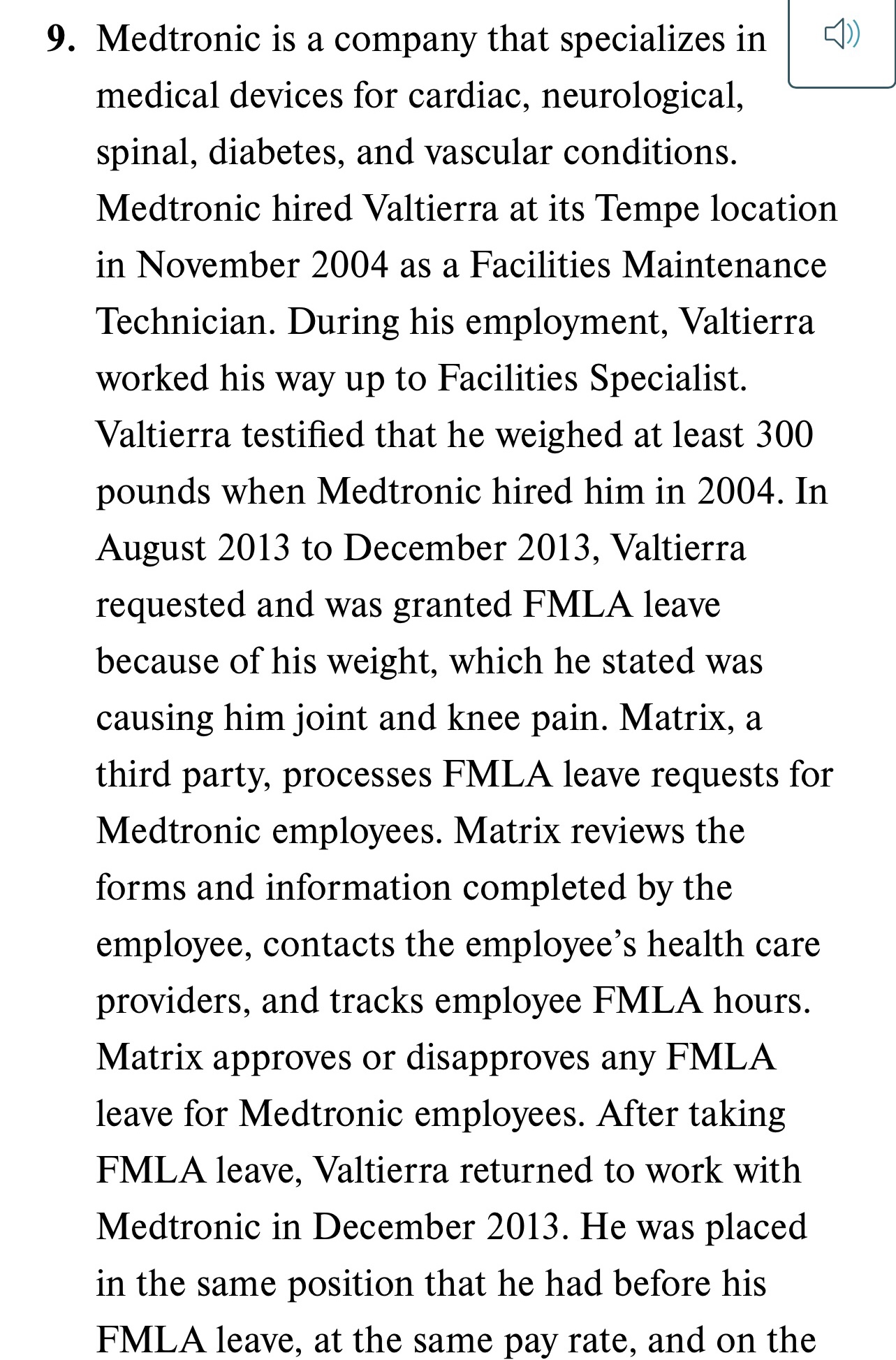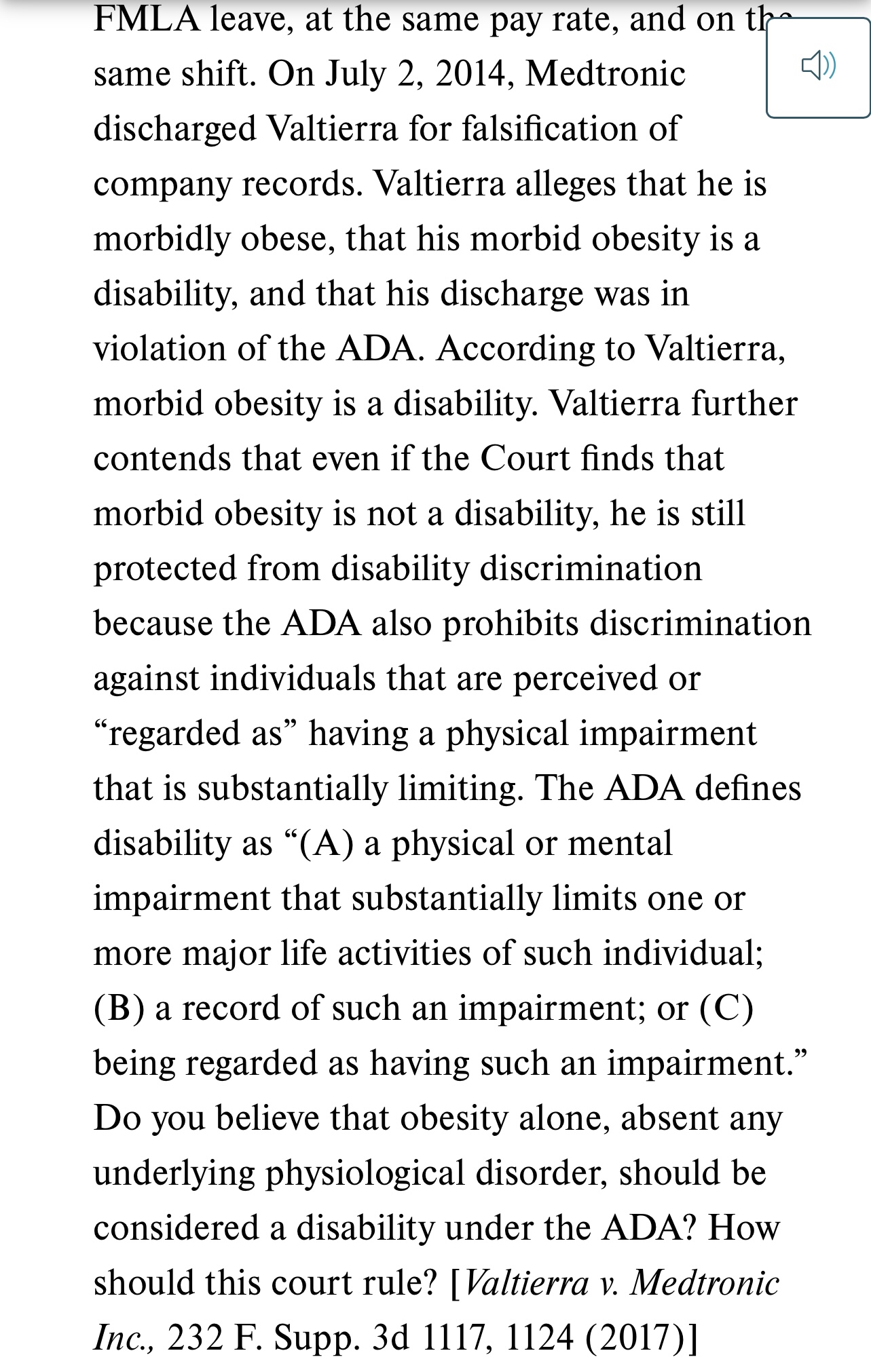Answered step by step
Verified Expert Solution
Question
1 Approved Answer
Medtronic is a company that specializes in medical devices for cardiac, neurological, spinal, diabetes, and vascular conditions. Medtronic hired Valtierra at its Tempe location in

 Medtronic is a company that specializes in medical devices for cardiac, neurological, spinal, diabetes, and vascular conditions. Medtronic hired Valtierra at its Tempe location in November 2004 as a Facilities Maintenance Technician. During his employment, Valtierra worked his way up to Facilities Specialist. Valtierra testified that he weighed at least 300 pounds when Medtronic hired him in 2004. In August 2013 to December 2013, Valtierra requested and was granted FMLA leave because of his weight, which he stated was causing him joint and knee pain. Matrix, a third party, processes FMLA leave requests for Medtronic employees. Matrix reviews the forms and information completed by the employee, contacts the employee's health care providers, and tracks employee FMLA hours. Matrix approves or disapproves any FMLA leave for Medtronic employees. After taking FMLA leave, Valtierra returned to work with Medtronic in December 2013. He was placed in the same position that he had before his FMLA leave, at the same pay rate, and on the FMLA leave, at the same pay rate, and on th same shift. On July 2, 2014, Medtronic discharged Valtierra for falsification of company records. Valtierra alleges that he is morbidly obese, that his morbid obesity is a disability, and that his discharge was in violation of the ADA. According to Valtierra, morbid obesity is a disability. Valtierra further contends that even if the Court finds that morbid obesity is not a disability, he is still protected from disability discrimination because the ADA also prohibits discrimination against individuals that are perceived or "regarded as" having a physical impairment that is substantially limiting. The ADA defines disability as "(A) a physical or mental impairment that substantially limits one or more major life activities of such individual; (B) a record of such an impairment; or (C) being regarded as having such an impairment." Do you believe that obesity alone, absent any underlying physiological disorder, should be considered a disability under the ADA? How should this court rule? [Valtierra v. Medtronic Inc., 232 F. Supp. 3d 1117, 1124 (2017)]
Medtronic is a company that specializes in medical devices for cardiac, neurological, spinal, diabetes, and vascular conditions. Medtronic hired Valtierra at its Tempe location in November 2004 as a Facilities Maintenance Technician. During his employment, Valtierra worked his way up to Facilities Specialist. Valtierra testified that he weighed at least 300 pounds when Medtronic hired him in 2004. In August 2013 to December 2013, Valtierra requested and was granted FMLA leave because of his weight, which he stated was causing him joint and knee pain. Matrix, a third party, processes FMLA leave requests for Medtronic employees. Matrix reviews the forms and information completed by the employee, contacts the employee's health care providers, and tracks employee FMLA hours. Matrix approves or disapproves any FMLA leave for Medtronic employees. After taking FMLA leave, Valtierra returned to work with Medtronic in December 2013. He was placed in the same position that he had before his FMLA leave, at the same pay rate, and on the FMLA leave, at the same pay rate, and on th same shift. On July 2, 2014, Medtronic discharged Valtierra for falsification of company records. Valtierra alleges that he is morbidly obese, that his morbid obesity is a disability, and that his discharge was in violation of the ADA. According to Valtierra, morbid obesity is a disability. Valtierra further contends that even if the Court finds that morbid obesity is not a disability, he is still protected from disability discrimination because the ADA also prohibits discrimination against individuals that are perceived or "regarded as" having a physical impairment that is substantially limiting. The ADA defines disability as "(A) a physical or mental impairment that substantially limits one or more major life activities of such individual; (B) a record of such an impairment; or (C) being regarded as having such an impairment." Do you believe that obesity alone, absent any underlying physiological disorder, should be considered a disability under the ADA? How should this court rule? [Valtierra v. Medtronic Inc., 232 F. Supp. 3d 1117, 1124 (2017)] Step by Step Solution
There are 3 Steps involved in it
Step: 1

Get Instant Access to Expert-Tailored Solutions
See step-by-step solutions with expert insights and AI powered tools for academic success
Step: 2

Step: 3

Ace Your Homework with AI
Get the answers you need in no time with our AI-driven, step-by-step assistance
Get Started


